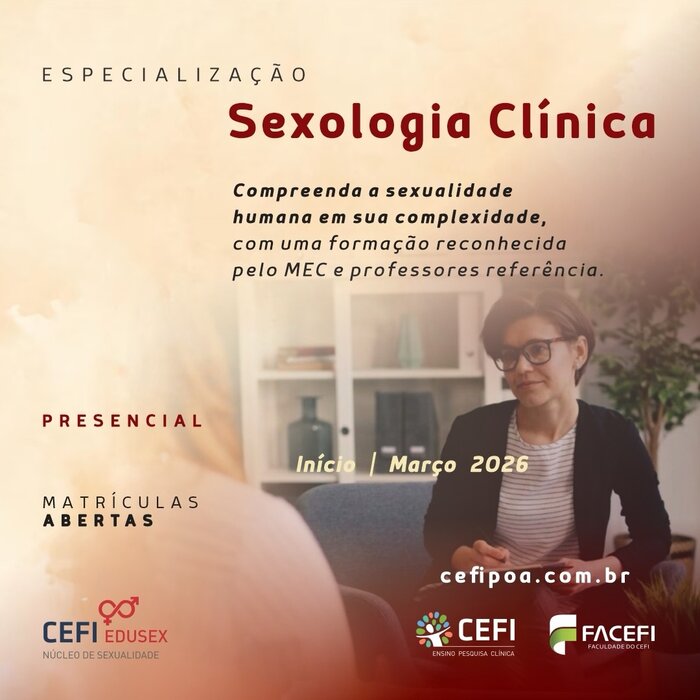Specialization in Clinical Sexology
General objective
Offer a specialization course in Clinical Sexology for Doctors and Psychologists at the level of their knowledge, attitudes and practices, in an inclusive, democratic and critical way.
Specific Objectives:
• Develop skills in working with the sexuality clinic in the application of assessment, diagnosis and intervention skills.
• Instrumentalize professionals with scientific and theoretical knowledge, as well as techniques and procedures related to sexual therapy;
• Empower health and human professionals to promote prevention, care and treatment in the sexual health of the diverse and lifelong population.
Differentials:
Course focusing on inclusive sexuality, content amplitude and intensification in practical experience.
goal
offer A Specialization Course in Clinical Sexology for Doctors and Psychologists at the level of their knowledge, attitudes and practices, in an inclusive, democratic and critical way.
Specific Objectives
> Skills at work with the sexuality clinic in the application of assessment, diagnosis and intervention skills.
> instrumental professionals with scientific and theoretical knowledge, as well as techniques and procedures related to sexual therapy;
> capacitar health and human professionals to promote prevention, care and treatment in the sexual health of the different and lifelong population.
Methodology
methodological diversity must be considered as a reality that is imposed on the construction of learning today. Contributions of cognitive social theory applied to education assume that self -regulation is an important ability to build knowledge. Self -regulatory students develop more cognitive, metacognitive, behavioral and motivational skills because they are more active in their learning process.
thus involves elaboration From problem situations, challenges, project elaboration, finally, the practical application of active learning based content, in line with the competence methodology adopted by IES. These methodologies involve ubiquitous communication, available to the student for access in any space and time, with the possibility of interaction and continuous learning, in person or via computational devices, and the interactivity of students with their own peers, teachers, tutors and content. This provides individual and cooperative expression, favoring autonomy in a process of authorship and co-authorship between teachers and students (Mantovani, et al., 2016).
the adopted methodologies involve the diversity of educational practices such as: expository classes; Theoretical classes, with application and evaluation of specific techniques; Seminars; Analysis and report of experiences and case studies; speeches; Discussion of texts; Cine-Foro, and other resources, in addition to research and other activities that are in line with the theme of each discipline. The opportunity to exercise learning will be offered through curriculum in different modality, with clinical supervision.
according to the pedagogical project Some activities online synchronous , They are foreseen in the approximate distribution of 60% in person and 40% remote. The remote will be mediated by Zoom, the discipline teacher will provide content designed specifically for each discipline, such as: ebook (Textbook), Learning Objects, Video-Alas, Infographics, Games , among others. Students have possibilities for interaction, through the thematic forums (asynchronous), of web Conferences (with prior content study) mediated by teachers, as well as clarify doubts, through the Forum for this purpose and other resources offered by Zoom. SPAN>
didactic-pedagogical will be continually open for reconfigurations, in view of the experiences in the operation of the courses.
Differentials
national and international teachers of excellence, clinical practice in various modalities and in Different contexts that starts in the first semester of the course, international activities of advanced studies in reference poles in research and sexual health care in Europe, the United States and other countries. Institutional clinical practices in reference services in sexual health. Face -to -face (60%) and online (40%) monthly classes.
Registrations and more information
Register by clicking the button below and have access to detailed content and receive contact from our team with the best conditions and scholarship options available.
Coordination
prof. Dr. João Alves, PhD
PSIC. Dr. Lina Wainberg, PhD
Enroll in the course
Target Audience:
doctors and psychologists

Total workload
480h/class

Period
Start: March 2022 to November 2023 (vacation in July and February)
Investment
Taxa de matrícula
R$ 396,00
Parcelas
Consultar opções de pagamento das mensalidades.



